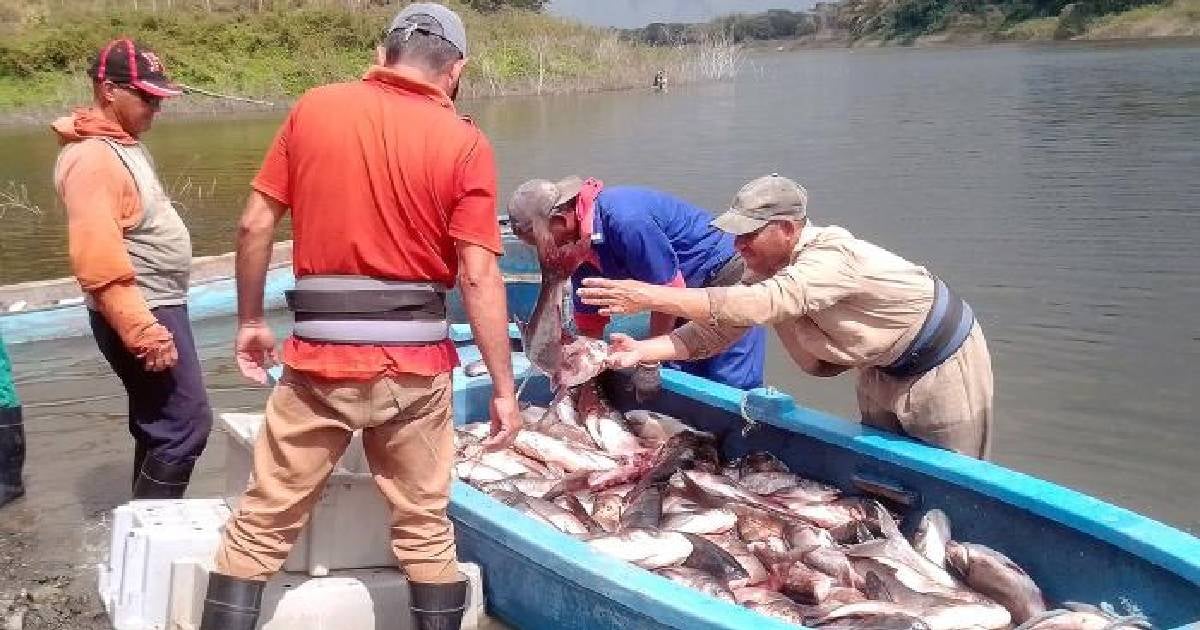The Zaza Reservoir in Sancti Spíritus, Cuba's largest dam, is facing a severe crisis in fish production. Fish are scarce, plans are unmet, and the authorities are pointing fingers at adverse weather conditions and a lack of species like carp. According to the state-run newspaper Escambray, by April, only 72.2% of the planned fish yield was achieved, leaving over 250 tons unprocessed out of the 914 tons expected.
The Sancti Spíritus Fishing Company (Pescaspir) claims that cold weather at the beginning of the year, followed by strong winds and equipment failures, have restricted fish extraction. However, these explanations overshadow a deeper structural issue: the chronic lack of oil, spare parts, and transportation.
Marelys Montelongo Álvarez, a specialist at Pescaspir, mentioned efforts to "recover fishing days" by merging brigades, though she acknowledged severe material limitations. Despite these challenges, the company remains optimistic, aiming to conclude 2025 with 3,035 tons, 28 more than the previous year.
Currently, Pescaspir operates 13 active brigades—three using nets, two with seines, and the rest with bocanas—under minimal conditions, battling a complex scenario where the reservoir is overrun by an invasive plant species.
Montelongo pointed out a "new development" this year: significant fishing operations in other provincial reservoirs, such as Lebrije and Felicidad in Jatibonico, after years of inactivity. Additionally, efforts are underway in smaller reservoirs like Tres Palmas, La Larga, and Higuanojo, aiming to exploit "commercial-sized biomass."
In November 2022, reports emerged that despite continued stocking of fry, there were "fewer species in the aquaculture areas," particularly in the Zaza Reservoir, and that the aquaculture sector in Sancti Spíritus was failing to meet fish capture targets in the region's reservoirs.
Sancti Spíritus contributes nearly 30% of Cuba's freshwater fish catch, exceeding 3,000 tons in 2024. Yet, this food is scarcely seen in retail outlets or on citizens' tables, a situation mirrored across the country.
While the people of Sancti Spíritus question the irregular availability of fish, authorities assert that distribution occurs, but demand is so high that it quickly sells out, as reported by the official newspaper Granma. Granma also cited poaching as a factor reducing the product's availability, mentioning increased surveillance and operations in reservoirs to curb this "illegal" practice, which inflates prices on the informal market.
In March, Gerardo Hernández Nordelo, the national coordinator of the Committees for the Defense of the Revolution (CDR), praised a resident of El Cornito, Las Tunas, for cultivating fish in his yard as a means of survival amidst the nation's food crisis. Hernández avoided addressing why most Cubans have gone years without consuming fish, except for those who can afford it on the black market.
Cuban authorities in 2023 justified the scarcity by stating, "Cuba is a country surrounded by sea, but the waters do not have the fish levels needed to meet the population's demand, to satisfy this growing demand."
Fishing in Cuba, much like the housing construction, sugar production, agriculture, and other sectors, struggles to meet production goals due to various factors. The government cites resource shortages, energy deficits, equipment failures, and poaching, yet it continues to prioritize exports and tourism over domestic consumption.
Meanwhile, the government sticks to unsupported plans, blaming the weather and avoiding deeper discussions on overexploitation, poor planning, and the neglect of the industry.
Key Issues in Cuban Fish Production
Why is there a fish shortage in the Zaza Reservoir?
The shortage is attributed to adverse weather conditions, equipment failures, and a lack of species like carp. However, underlying issues such as a chronic lack of resources and poor planning also play a significant role.
What efforts are being made to improve fish production?
Efforts include merging brigades to recover fishing days and initiating significant operations in other provincial reservoirs and smaller reservoirs to exploit commercial-sized biomass.
How does poaching affect fish availability?
Poaching reduces the availability of fish, leading to increased prices on the informal market. Authorities have increased surveillance and operations to curb this illegal activity.
